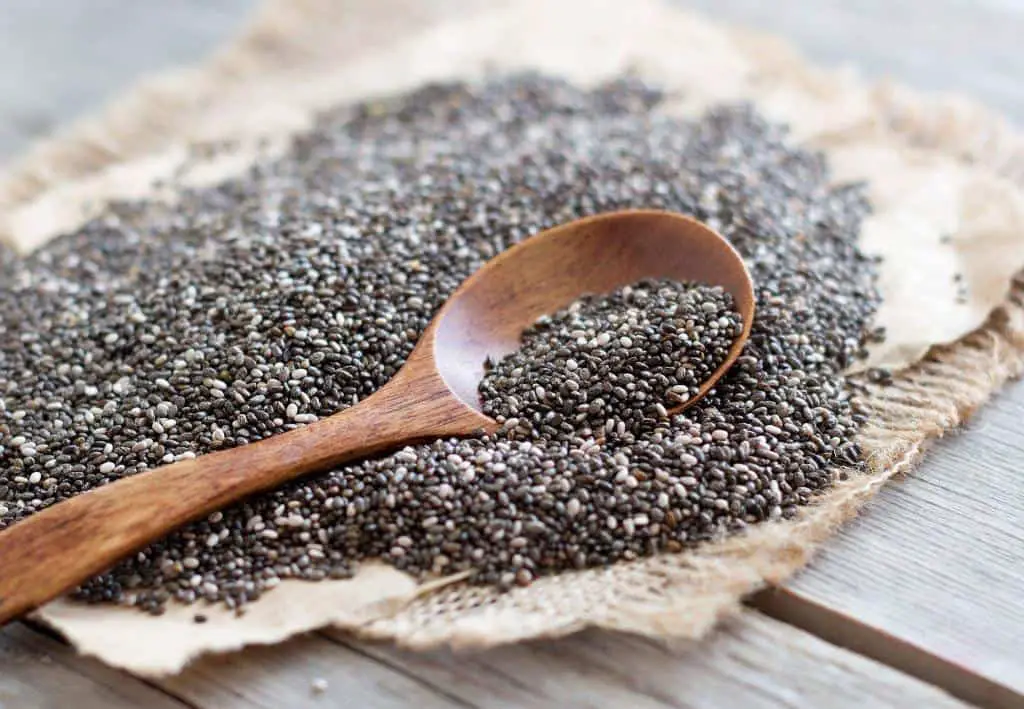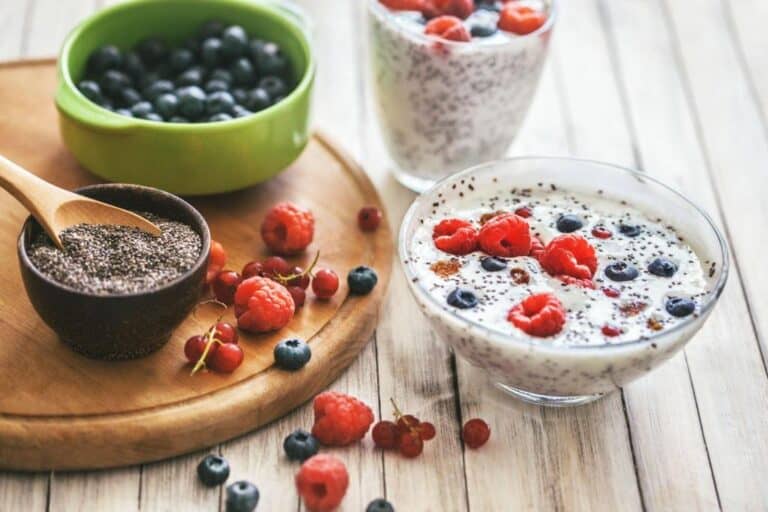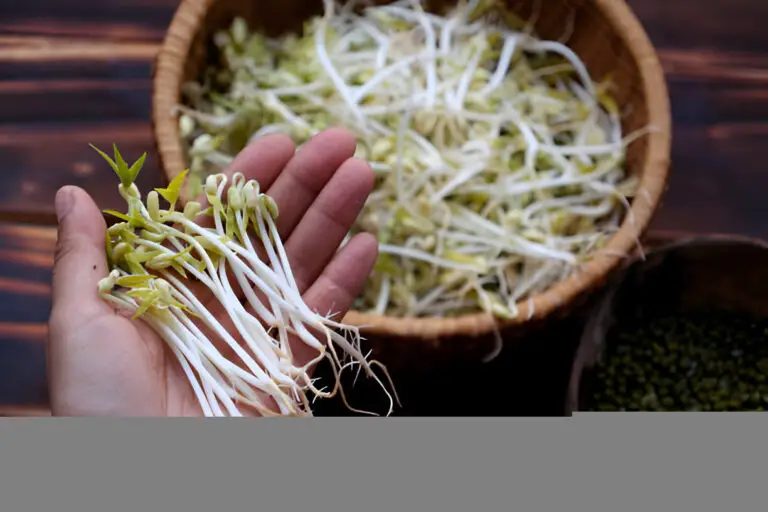Can Chia Seeds Cause Bloating and Upset Your Stomach?

Chia seeds have been gaining popularity in recent years for their numerous health benefits and versatility in the kitchen. These tiny seeds, packed with essential nutrients like omega-3 fatty acids, fiber, protein, and antioxidants, are often touted as a superfood that can boost energy levels and promote overall well-being. However, as with any new addition to our diet, it’s natural to wonder about potential side effects or digestive issues.
So, can chia seeds cause bloating and upset your stomach? Chia seeds can cause bloating and upset your stomach, especially if you consume too many of them or don’t know how to use them properly.
In this article, we will delve into the realm of chia seeds and explore how they can cause bloating and upset stomachs. We’ll address common concerns surrounding these inconveniences that some individuals may experience after consuming chia seeds.
With research-backed information at hand, we aim to provide you with a balanced perspective on incorporating chia seeds into your diet while minimizing any potential discomfort along the way.
Understanding Chia Seeds

Before we address the potential digestive effects, let’s get acquainted with chia seeds. These small, black or white seeds come from the Salvia hispanica plant, native to Mexico.
Historically, chia seeds were a dietary staple for ancient civilizations, revered for their energy-boosting properties. In modern times, chia seeds have resurfaced as a nutrient-dense addition to various dishes, from smoothies to puddings.
Chia seeds are rich in fiber, healthy fats (particularly omega-3s), protein, calcium, magnesium, and antioxidants—all packaged within just a few calories. It’s no wonder these little powerhouses have captured our attention! From adding them to smoothies and oatmeal to using them as an egg substitute or creating delicious puddings – chia seeds are incredibly versatile in culinary applications.
Nutritional Profile of Chia Seeds
Chia seeds have gained popularity in recent years due to their impressive nutritional profile and potential health benefits. One of the key reasons why many people choose to incorporate chia seeds into their diet is because of chia seeds’ high fiber content.
Just one ounce (about 2 tablespoons) of chia seeds provides a whopping 11 grams of dietary fiber, which is about one-third of the recommended daily intake for adults.
In addition to fiber and omega-3 fatty acids, chia seeds also contain essential vitamins and minerals such as calcium, phosphorus, magnesium, and manganese. These nutrients support bone health, regulate blood sugar levels, promote muscle function, and contribute to overall well-being.
Chia seeds boast an impressive nutritional profile. A 1-ounce (28-gram) serving provides:
- Fiber: 11 grams
- Protein: 4 grams
- Omega-3 Fatty Acids: 5 grams
- Antioxidants, Vitamins, and Minerals
Overall, incorporating chia seeds into your diet can be an excellent way to enhance your nutrient intake. Your body will potentially reap the various health benefits associated with these tiny but mighty superfoods.
Digestive System Function: How Your Body Breaks Down Food
Our digestive system is made up of many organs and tissues that work together to break down food into nutrients that our bodies can use. This intricate process allows the body to extract vitamins, minerals, and energy from the foods we eat.
It all begins in the mouth, where enzymes in saliva start to break down carbohydrates. As food moves along the esophagus, it enters the stomach, where gastric juices containing hydrochloric acid help further break down proteins.
The food is then partially broken down and moves to the small intestine. There, bile acids from the liver break down fats, and enzymes from the pancreas and intestinal cells help break down carbs, proteins, and fats.
Throughout this journey through different parts of the gastrointestinal tract (GI), special cells lining these organs release hormones such as gastrin or cholecystokinin that regulate hunger levels and coordinate digestive processes.
Finally, in the large intestine (colon), water absorption occurs before any undigested materials are excreted as feces.
This incredible coordination between different organs ensures effective processing of food so that our bodies can obtain essential nutrients for growth, repair damaged tissues, and maintain overall health.
Understanding how your digestive system works is key to assessing the potential effects of specific foods on digestion – including chia seeds – which we will explore in more detail next.
Fiber Content in Chia Seeds: A Potential Cause for Bloating?
Chia seeds are often hailed as a nutritional powerhouse, packed with fiber and essential nutrients. Chia seeds’ high fiber content may cause bloating and digestive issues in some people.
Fiber is important for digestion and keeping bowel movements regular, but too much fiber or a sudden rise in fiber intake can cause unwanted side effects. If you eat chia seeds quickly or do not drink enough water, the soluble fibers in them can soak up liquid and expand in your digestive tract. This expansion can cause bloating by creating extra gas in the intestines.
It’s worth noting that not everyone experiences these symptoms after consuming chia seeds. There are some people who have no problems at all. Others may feel some mild discomfort at first but get used to digesting the extra fiber over time.
If you’re prone to digestive issues or already have a sensitive stomach, it might be wise to introduce chia seeds gradually into your diet and monitor how your body reacts.
To minimize potential abdominal bloating when putting chia seeds into your meals or snacks, consider soaking them beforehand. Soaking chia seeds allows them to absorb water more gradually before reaching your digestive system. Doing so could potentially reduce any expansion-related bloating effects during digestion.
When you eat more fiber-rich foods, like chia seeds, you need to stay hydrated throughout the day. Ensuring an adequate fluid intake helps support optimal digestion of fibrous foods like these tiny superstars.
Preparing Chia Seeds Properly: Soaking or Grinding Chia Seeds
While chia seeds are an excellent source of nutrients and fiber, some individuals may experience bloating or an upset stomach after consuming them. However, this does not mean that chia seeds should be avoided altogether. With the right preparation methods, you can minimize these potential digestive issues and fully enjoy the benefits of chia seeds.
Soaking Chia Seeds:
Soaking chia seeds in water or a liquid of choice can be an effective way to unlock their nutritional potential. This process allows the seeds to absorb liquid, creating a gel-like consistency. Here’s a quick guide:
- Ratio: Use a 1:3 ratio of chia seeds to liquid.
- Time: Soak for at least 15 minutes to allow proper absorption.
| Related: How Long To Soak Chia Seeds in Yogurt to Maximize Nutritional Benefits |
Grinding Chia Seeds:
Alternatively, grinding chia seeds transforms their texture, making them easier on the digestive system. A simple electric grinder can be employed for this purpose. Key points to consider:
- Grind Size: Achieve a coarse to fine texture based on personal preference.
- Storage: Store ground chia seeds in an airtight container to preserve freshness.
By soaking or grinding your chia seeds before consuming them regularly as part of balanced meals or snacks throughout the day rather than eating large amounts all at once, you may find that any bloating or digestive discomfort is greatly reduced while still reaping all the nutritional benefits offered by these tiny powerhouses.
Remember, though; each person’s digestive system responds differently. if persistent issues arise despite trying different methods of preparation, it is always recommended to consult with a healthcare professional or registered dietitian for personalized advice.
Those Prone to Bloating
While chia seeds are generally well-tolerated by most individuals, there is a subset of people who may be more prone to experiencing bloating and digestive discomfort after consuming high-fiber foods like chia seeds. One such group includes individuals with irritable bowel syndrome (IBS), a chronic gastrointestinal disorder characterized by symptoms like abdominal pain, bloating, and changes in bowel habits.
According to research, the soluble fiber in chia seeds can ferment in the gut when bacteria break it down. This could cause gas and bloating in people with IBS or other sensitive digestive systems. Some individuals have specific food sensitivities or intolerances that can contribute to digestive issues when consuming certain types of fiber-rich foods.
Also, excessive chia seed consumption or suddenly adding them to your diet without gradually increasing fiber intake may cause digestive discomfort. To minimize the risk of bloating and an upset stomach, it is advisable for those who are prone to these issues to start with smaller portions. Gradually increase their intake over time while monitoring how their body responds.
Also, adding chia seeds to meals rather than consuming them on their own can help ease digestion. They will be mixed with other ingredients during meal preparation. Always listen to your body and make necessary adjustments based on individual tolerance levels.
It is also advisable to consult with a healthcare professional or nutritionist who can help determine an appropriate serving size based on your specific needs and tolerances.
| Also see: How to Cook Green Beans to Prevent Gas and Bloating? |
Listening To Your Body
One of the most important factors in understanding how chia seeds may affect your digestion is to listen to your body. Each person’s digestive system functions differently, and what works well for one person may not work as smoothly for another. You need to pay attention to any changes or discomfort you experience after consuming chia seeds.
Keep track of how different quantities of chia seed consumption affect your overall well-being. If you notice bloating or an upset stomach after eating a specific amount of chia seeds, it could be an indication that you need to reduce your intake slightly. On the other hand, if you find that smaller portions don’t cause any digestive issues but still provide health benefits, there is no need to push yourself towards larger servings.
Remember, everyone has their own unique tolerance level when it comes to certain foods. Trusting your instincts and making adjustments accordingly will help ensure a positive experience when including chia seeds in your diet without compromising digestive comfort.
Healthy Digestive Habits
While chia seeds are a nutritious addition to many diets, it’s important to remember that achieving overall digestive health requires more than just one food. Adding chia seeds to a healthy diet that also includes other fiber-rich foods can help digestion and keep you from getting bloated or uncomfortable.
In addition to consuming chia seeds, it is also essential to maintain good hydration levels throughout the day. Staying hydrated aids in proper digestion and helps prevent constipation, which can be a common cause of bloating. Consider drinking herbal teas or infused waters in addition to eight glasses of water per day.
To further support healthy digestion, try combining chia seeds with fruits and vegetables known for their digestive benefits. Foods such as bananas, raw avocados, ginger, and leafy greens contain enzymes and fiber that aid in digestion. Adding these foods alongside chia seeds can maximize the digestive benefits and minimize any potential discomfort.
Consultation with a Healthcare Professional
If you find yourself consistently experiencing bloating or upset stomachs after consuming chia seeds, it may be worth consulting with a healthcare professional. While chia seeds are generally safe for consumption and many people enjoy their healthful benefits without any digestive issues, individual responses can vary.
A healthcare professional can conduct an evaluation of your overall health and assess any underlying conditions that may contribute to the discomfort associated with chia seed consumption. They will also be able to review your dietary habits and provide personalized guidance on how to incorporate chia seeds into your diet in a way that minimizes potential digestive issues.
Remember, everyone’s body is unique, and what works well for one person might not work as effectively for another. Seeking professional advice ensures that you receive tailored suggestions specific to your needs, so you can enjoy the nutritional benefits of chia seeds without encountering significant digestive troubles.
Conclusion
In conclusion, the intricate relationship between chia seeds and digestive well-being is a nuanced journey worth exploring. The exploration of chia seed digestion, their gastrointestinal effects, the possibility of bloating from chia seeds, and the spectrum of digestive reactions to chia seeds has shed light on the importance of mindful consumption.
While some individuals may experience stomach discomfort, understanding the factors at play allows for informed dietary choices. Gradual introduction, adequate hydration, and creative incorporation into recipes can transform chia seeds from potential digestive disruptors into nutritional allies. Embracing the balance between reaping the benefits of chia seeds and safeguarding digestive harmony is key.
As you navigate the realm of chia seeds and stomach health, let this guide empower you to make choices that align with your body’s unique needs. Chia seeds, with their incredible nutritional profile, can indeed be part of a wholesome diet when approached with awareness and consideration for digestive reactions. Enjoy the journey of discovering how chia seeds can enhance your well-being, one mindful bite at a time.
FAQs
How do chia seeds affect digestion?
Chia seeds, rich in fiber, may cause bloating in some individuals. The fiber content absorbs water and swells, potentially leading to discomfort. Soaking or grinding chia seeds before consumption can aid digestion by making them gentler on the stomach.
Is bloating common after eating chia seeds?
Yes, bloating can occur after consuming chia seeds due to their high fiber content. The body may take time to adjust to this fiber, and individual tolerance levels vary. Moderation, proper preparation, and staying hydrated can minimize the likelihood of bloating.
Can chia seeds upset my stomach?
Chia seeds can upset the stomach for some people. The high fiber and omega-3 fatty acids may lead to gastrointestinal discomfort. Trying different preparation methods, such as soaking or grinding, can help alleviate potential stomach upset.
Are there side effects of eating too many chia seeds?
Eating excessive chia seeds can lead to bloating, gas, and stomach discomfort. Their high-fiber nature, while beneficial, requires moderation. Ensure a balanced intake, stay hy
Can chia seeds cause long-term stomach discomfort?
While chia seeds can cause temporary stomach discomfort, persistent issues may signal an individual’s sensitivity. Gradually introducing chia seeds, adjusting portion sizes, and consulting a healthcare professional can address long-term concerns.
Are there variations in digestive reactions to chia seeds among individuals?
Yes, digestive reactions to chia seeds vary. Factors such as personal tolerance, overall diet, and digestive health contribute to individual responses. Customizing chia seed consumption based on these factors can help mitigate discomfort and enhance digestive well-being.






